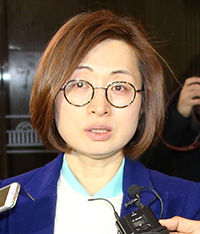- California Assembly OKs highest minimum wage in nation
- S. Korea unveils first graphic cigarette warnings
- US joins with South Korea, Japan in bid to deter North Korea
- LPGA golfer Chun In-gee finally back in action
- S. Korea won’t be top seed in final World Cup qualification round
- US men’s soccer misses 2nd straight Olympics
- US back on track in qualifying with 4-0 win over Guatemala
- High-intensity workout injuries spawn cottage industry
- CDC expands range of Zika mosquitoes into parts of Northeast
- Who knew? ‘The Walking Dead’ is helping families connect
Opposition lawmaker breaks record for longest filibuster
SEOUL (Yonhap) An opposition lawmaker set the record for the longest filibuster in Korean history Wednesday, delivering a 10 hour and 18 minute address on the parliamentary floor to block the passage of an anti-terrorism bill.
Rep. Eun Soo-mi of the Minjoo Party began giving her address before a largely empty National Assembly at 2:30 a.m. and got off the podium at 12:48 p.m., replacing the record set more than 40 years ago. The previous record was set by Park Han-sang in 1969, a then-opposition lawmaker, who gave a 10 hour and 15 minute address against the constitutional amendment drive by the Park Chung-hee government.
On the podium, Eun reiterated the opposition’s concerns over a potential abuse of power by the National Intelligence Service (NIS), South Korea’s top spy agency.
“I feel pain in many parts of my body including the back and legs,” Eun told reporters after her filibuster. The first-term lawmaker said she tried to make her points clear why the anti-terrorism law entailed problems during her address.
The filibuster rule allows a lawmaker to speak endlessly in order to delay a bill.
The filibuster session by the Minjoo Party followed National Assembly Speaker Chung Ui-hwa’s decision a day before to take the bill to the floor for a vote by invoking his authority.
The anti-terrorism law has been stalled for more than a decade. Since the first draft was filed with the National Assembly following the Sept. 11 attacks in 2001 to effectively combat terrorism, no major progress has been made. The bill’s passage has gained urgency following North Korea’s nuclear test and long-range rocket launch early this year.
Under the bill, an anti-terrorism center will be set up under the Prime Minister’s Office, but the NIS will have the power to gather the relevant information on possible terrorists and attacks.
Opponents of the bill say the spy intelligence agency could abuse the power of the new law to break into smartphones to access innocent people’s personal data and to monitor political dissidents.
President Park Geun-hye criticized the Minjoo’s attempt to derail the pending bill and asked whether the opposition will pass it only after people suffer through terrorist attacks.
“I think we are witnessing a nonsense situation not seen in any other countries,” lamented Park of the ongoing gridlock.
The ruling Saenuri Party slammed the Minjoo Party for its filibuster to thwart the bill’s passage and urged it to end the ongoing discussion on the floor.
“The opposition’s filibuster to block the anti-terrorism law at a time of heightened tensions is an act of terror against the safety of the people,” said Saenuri floor leader Won Yoo-chul during a party meeting. Won also called on the opposition to act in a bipartisan manner to ensure national security by voting on the long-stalled law.
Calls among ruling party lawmakers for the bill’s swift passage have become more acute after North Korea threatened to strike Cheong Wa Dae, South Korea’s presidential office, on Tuesday night in its usual harsh rhetoric.
While the rival parties continue to lock horns over the contentious bill, police arrested two civic activists on charges of violating the law on assembly and demonstration Wednesday. The police said the two, identified only by their surnames Kim and Yoon, picketed and chanted in protest of the law in front of the National Assembly at around 3:15 a.m. The two were released hours later after questioning.
















